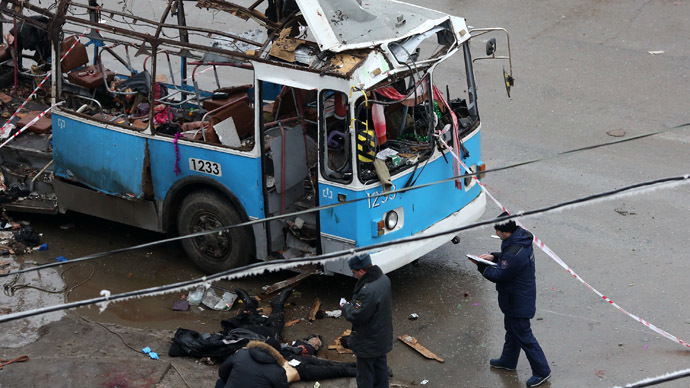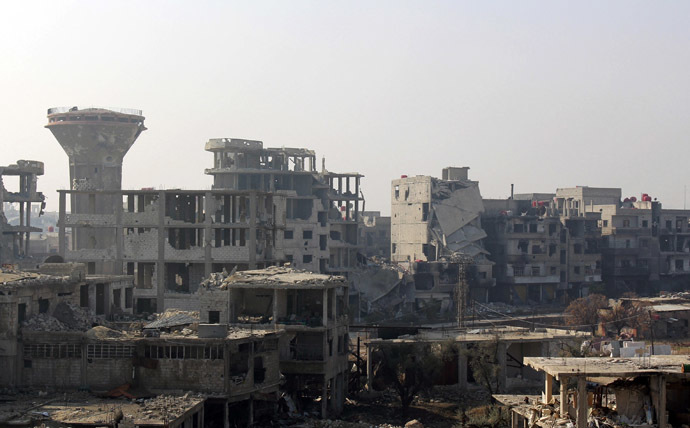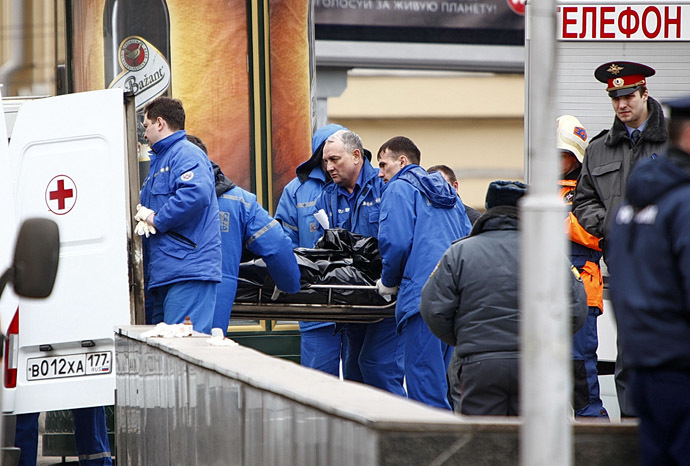Waging war on Russia: Looking into Volgograd terror blasts

The heinous terrorist attacks in Volgograd in recent days are merely the latest chapter in a terrorist war aimed at destabilizing Russia politically and economically, while tearing at the very fabric of Russian society.
As the families of the more than 30 dead mourn their loved ones, details of the incidents are beginning to paint an all-too familiar picture for anyone who has followed the development of jihadi groups in the Russian Caucasus. A suicide bomber detonates explosives inside a crowded railway station, killing at least 17 and wounding many more. Another bomber strikes an electric trolleybus, killing 14 and critically wounding many more, including several small children. Such scenes of carnage are nothing new to the Russian people, who have endured nearly two decades of terrorism and paid a heavy price in lives and resources.
While it is always important to take time to remember the innocent lives lost, it is equally critical to examine these incidents in the broadest political and geopolitical context in order to understand how and why these tragedies occurred.
Specter of Terrorism in Russia
Since the fall of the Soviet Union, the Russian people have been repeatedly victimized by acts of terrorism emanating from the Caucasus region. Beginning in 1999, with the infamous apartment bombings that killed more than 300 innocent people in several cities including Moscow, there have been a number of high-profile attacks all across the country, including the bombing of airports, marketplaces, trains and bus stops, targeted assassinations of community and religious leaders, as well as the infamous Moscow theater hostage crisis of 2002. These incidents are far more than mere national tragedies to be understood in isolation from one another. Rather, they represent a continuing campaign of terror by internationally connected jihadi organizations, based in the Russian Caucasus, who are intent on waging war against the Russian people and the Russian state.
While the facts surrounding the most recent bombings are still being gathered, investigators have noted that the tactics – a suicide bomber in a crowded public space – are characteristic of the terror organizations of the Caucasus, either directly or loosely affiliated with Al-Qaeda. In fact, it seems that this recent attack simply replicates the tactics of a similar attack which killed a prominent Muslim cleric in the Russian republic of Dagestan in 2012. Such incidents have become all too common in the troubled region, particularly as jihadi organizations take root in places like Syria, a mere 800 miles from the Russian Caucasus.
When analyzing jihadi terrorism in Russia, the name Doku Umarov and his Imarat Kavkaz organization, will undoubtedly appear. Umarov has a long track record of organizing terrorist operations in Russia, including kidnappings, bombings and assassinations. His propaganda outfit, known as Kavkaz Center, has an extensive history of supporting and legitimizing terrorist actions throughout the region, rationalizing atrocities committed in the name of “resistance.” In fact, Kavkaz engages in perpetual upside-down logic, referring to Russians as “terrorists” and terrorists as “heroes.”
This type of Goebbels-esque propaganda is the hallmark of Western imperialist projects; most recently in the conflict in Syria in which the Western corporate media and the like refer to terrorism and subversion as “rebellion and freedom-fighting.” Additionally, it is essential to note that Imarat Kavkaz (Umarov’s terrorist organization translated as “Caucasus Emirate”) has been listed by the United Nations as an organization associated with Al-Qaida. Kavkaz Center has been described by Umarov himself as “the official information organ of the Imarat Kavkaz.” This, of course, supports the claims made repeatedly by Moscow of the connection between Chechen and other extremists in the region and Al Qaeda, a claim which, until recently, Kavkaz Center continued to deny.

Geopolitics of Terrorism in Russia
One cannot simply focus on Umarov or any other individual terrorist group, for that would be not seeing the forest for the trees, missing entirely the larger context within which such acts of terror occur. As a world power, Russia finds itself at the forefront of some of the key geopolitical conflicts in the world today. Whether playing the role of peacemaker in Syria, oil superpower, or weapons/defense manufacturer, Russia is perpetually in conflict with Western powers who seek to further expand their hegemony throughout Eurasia even if takes form of a ‘missile shield’.
In examining possible connections between the recent terror attacks and world events, the continuing conflict in Syria immediately comes to the fore. Not only has the war in Syria dragged Russia, along with other world powers, into a political conflict, it has also energized the terror networks of the Russian Caucasus. As the Huffington Post, along with a number of other mainstream media sources, has documented, Chechen (and other Caucasian) fighters constitute a sizeable contingent among the jihadi elements waging war on Assad and the Syrian people (though this has been denied by Chechnya’s leadership). Groups such as the Muhajireen Brigade, led by their commander known as Abu Omar al-Chechen, have been instrumental in maintaining the fighting in the face of the defeat of many of the Syrian and regional jihadi groups.
Although terrorists from the Caucasus are having a major impact on the ground in Syria, perhaps the greater threat is their ability to freely travel back to their places of origin. Keeping in mind that Syria is only about 800 miles from the Russian Caucasus, the danger is self-evident: battle-hardened fighters returning from the war in Syria bring with them their newly acquired expertise as killers, only to turn their attention back to their perceived great enemy: Russia.
Of course, the question of proximity to Syria is important for another, perhaps more frightening reason – the closest major Russian city is Sochi, site of the Olympics next month. Naturally, many have speculated that the Olympics were a motivating factor for carrying out the attacks in Volgograd, that they were intended to send a message to both Moscow and the world on the eve of the games.
While the extent to which Sochi was a motivating factor is up for debate, what is undeniable is that Russia occupies a precarious space in global politics, one that often leads to conflicts, both overt and covert, with other nations and global powers. Countries such as Saudi Arabia, Qatar, and Israel, all part of the greater US-NATO sphere of influence, have a vested interest in ensuring that Russia does not cement its dominance of energy supplies to Europe in the coming decades.
Any conflict between Russia and these countries, as we see currently playing out in Syria, should be understood as merely one aspect of a larger geopolitical and strategic conflict between Russia and the West (US-NATO-GCC-Israel primarily). As the Russian Caucasus has become a critical part of Russian energy delivery infrastructure, it has taken on an added importance. The South Stream Pipeline, along with a number of other projects, has positioned Russia as a principal energy source for Europe, thereby weakening the position of Western energy interests who would love to monopolize the flow of oil to Europe. As long as Saudi Arabia and other US clients continue to be a primary source of energy, their interest will always be the destabilization of Russia.
Terror Lobby
Although one might be able to pinpoint the terrorist group that carried out the atrocities of recent days, this is merely the first step. Far more important in the long term is an understanding of how such organizations operate and how they survive. In the Russian Caucasus, Doku Umarov and similar leaders only exist because of an elaborate network of financiers and influential policymakers who portray their war of terrorism as a “liberation struggle.” Terrorists such as Umarov are best understood by their connection to the various organs of Western intelligence.

One such entity that bears scrutiny is the American Committee for Peace in the Caucasus (ACPC), previously known as the American Committee for Peace in Chechnya. As reported by Right Web at the Institute for Policy Studies: “The ACPC was founded in 1999 by Freedom House, a neoconservative organization that has worked closely with the U.S. government, receiving funds from the National Endowment for Democracy and other US democratization initiatives.” This intimate relationship between the ACPC and the US State Department indicates not merely a confluence of interests, but rather a direct relationship wherein the former is an organ of the latter.
The paternalistic role of the US intelligence establishment in the ACPC is made all the more evident when one examines some of the more well-known members of the ACPC, including former National Security Advisor Zbigniew Brzezinski, former Pentagon advisor Richard Perle and other top neocons such as William Kristol, Elliott Abrams, Kenneth Adelman and Robert Kagan. What becomes apparent in even a cursory analysis of these figures is that, despite the preponderance of neoconservatives, the top members of the ACPC are pulled from both the liberal and conservative establishments. Therefore, one can see how the ACPC represents a bipartisan consensus within the US ruling class – a consensus of aggression against Russia.
The ACPC has taken the lead in championing the cause of separatism and terrorism directed toward Russia, both tacitly and overtly. After having championed the cause of former Chechen Foreign Minister Ilyas Akhmadov in his quest for asylum in the United States – subsequently granted along with a generous taxpayer-funded stipend – ACPC member Zbigniew Brzezinski went so far as to write the foreward to Akhmadov’s book “The Chechen Struggle.” The alliance between political figures such as Akhmadov and terrorist leaders in the region demonstrates conclusively the partnership between the various terror networks and the ruling class in the West.
Situated between Syria and Central Asia, and straddling the energy-rich Caspian region, the Russian Caucasus has become a flashpoint in world affairs. The geopolitical realities are brought into stark relief by the unimaginable grief of the families of innocents killed needlessly by these horrific acts of terrorism. In mourning the dead, we must come to understand more clearly, and on a systemic level, how international terrorism operates, and how it is used as a weapon by the forces of empire.
The statements, views and opinions expressed in this column are solely those of the author and do not necessarily represent those of RT.
The statements, views and opinions expressed in this column are solely those of the author and do not necessarily represent those of RT.













